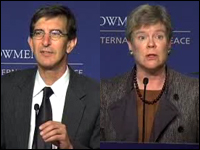Registration
You will receive an email confirming your registration.
Carnegie scholars George Perkovich and Rose Gottemoeller discussed the superstructure of the nuclear order and called for U.S. leadership in disarmament and reinvigorated U.S.-Russian arms control cooperation.
George Perkovich began the discussion emphasizing that a U.S. commitment to abolishing nuclear weapons is essential to strengthening the nonproliferation regime and shoring up U.S. security interests globally. Abolishment should not be framed as a unilateral or moral decision, but rather a strategic choice that best serves U.S. interests. Abolition requires strengthening verification and enforcement; enhancing nonproliferation rules, inspections, and control of fissile materials; bolstering accounting mechanisms, and reducing risks of nuclear weapon use. Nuclear weapons cannot be disinvented, but similar to gas chambers, nuclear weapons can be eradicated and universally denounced with enforcement.
Rose Gottemoeller underlined the need for U.S.-Russian engagement to secure and further the nonproliferation regime and enhance global security. First, the U.S. should extend the START treaty for five years, but under a political agreement to finalize a new treaty within one year, including its ratification. Second, the next administration should utilize the Conventional Armed Forces in Europe Treaty to engage Russia in developing a new system of European security. Finally, the U.S. should convene a commission of past U.S. and Russian presidents to raise confidence between Russia and the West and address the serious problems of European security-building.
Participants posed whether Perkovich's abolition objective would be best pursued by an agency within the government. Before creating a separate agency, Perkovich proposed tasking the National Security Council to require each department to develop papers on what would be required to pursue such an objective. He further emphasized that the U.S. should not unilaterally disarm, but rather seek to address the security situations currently blocking abolition. Resolving these issues would both improve American security and allow for further international disarmament.
Regarding Gottemoeller's discussion, participants questioned whether the Cooperative Threat Reduction (CTR) should also be a priority item for the next administration to reenergize. Gottemoeller agreed, but argued that the CTR must develop from mainly an assistance program into a true cooperative initiative requiring Russia to take responsibility alongside the United States.
